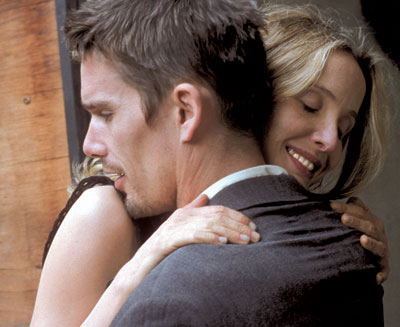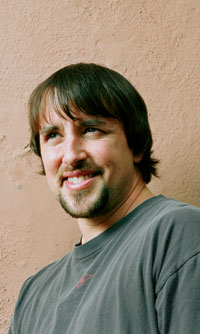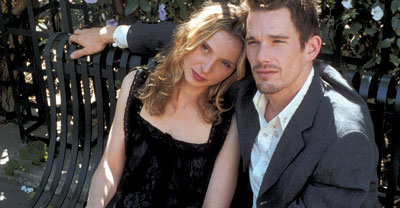PARIS BY DAY
A rare “indie-film sequel,” Before Sunset reunites director Rick Linklater with actors Ethan Hawke and Julie Delpy, who reprise the idealistic lovers they played in his Before Sunrise nine years earlier. Older, wiser, but still hot for each other, the couple meet by chance in Paris and spend the afternoon pondering life’s essential “what-if’s?” Matthew Ross speaks with Linklater about collaborating with his actors, long-take filmmaking, and the possible next volume in the series.
 |
| Julie Delpy and Ethan Hawke reunite in Richard Linklater's Before Sunset.
PHOTO: EMILIE DE LA HOSSERAYE. |
Nearly a decade has passed since the release of Richard Linklater’s third feature, Before Sunrise. A sweet, acutely observed story of a romantic encounter between an American boy (Ethan Hawke) and a French girl (Julie Delpy) in Vienna, the film is a simple but very effective expression of what it is to be young, hopelessly romantic and not yet scarred by adulthood. Perhaps the most compelling aspect of that story is its ending: as they embrace on a train platform, young Jessie and Celine vow to meet again exactly six months later. Whether they actually reunite remains a mystery and, as such, functions as a test of the viewer’s faith: the cynics in the audience expected the relationship to end there, while the die-hard romantics were sure these two would have a future together. Most of us couldn’t make up our minds.
Nine years later, with Before Sunset, Linklater has given us some, if not all, of the answers. Jessie, now married with a young son, is in Paris to promote his celebrated first novel, a thinly veiled account of those life-altering 14 hours in Vienna. Just as he’s finishing up his reading, he sees Celine waiting patiently in a corner. With only a few hours before his plane back to the States, Jessie invites her for coffee. And it’s off to the races, Linklater-style. For the next 90 minutes, we watch in real time as the old lovers walk and talk their way through Paris, revealing who kept the promise and who didn’t, and what wounds and successes they’ve each endured in the years since. But as the story winds to a close, we soon find that any resolution we’d been given at the film’s beginning has since been taken away again.
Open endings are nothing new to art films, but studios usually use them for one reason only: as cliffhangers to beget a franchise. Linklater, always the innovator, has managed to combine the two approaches: he’s made an art-film sequel. Armed only with a Steadicam, available light and a couple of actors, the director returns to his naturalistic roots while also borrowing a page from vintage Rohmer — all the while daring us to listen to regular people talk, uninterrupted, for an hour and a half. To judge from the rapturous response Sunset received after the film’s premiere at the Berlin Film Festival, the gamble paid off.
Linklater, who co-wrote the film with Hawke and Delpy, has been on a roll recently. In 2001 he directed two well-received indies: the animated Waking Life and the IndDigEnt DV drama Tape (also starring Hawke). And last year he proved he could make a mint at the box office — and handle a studio-size budget — when his critically acclaimed Jack Black comedy School of Rock earned more than $80 million. Before Sunset, which Warner Independent Pictures releases on June 25, marks yet another breakthrough.
 |
| Director Richard Linklater.
PHOTO: MARIO DE LOPEZ. |
Richard Linklater: [Laughs.] Yeah, and [Before Sunrise is] probably the lowest-grossing film to ever spawn a sequel! There’s a lot to be proud of.
Filmmaker: Why did you decide to make this film? And why now?
Linklater: Well, it’s something we’ve talked about over the years. Julie, Ethan and I would get together, and I could tell there was something still stirring in all of us. An early idea was to shoot what happened six months later rather quickly and then wait a few years and shoot the other, say, hour that took place years later. But we didn’t quite get it together — everybody was busy. But there was this desire we all had, just some kind of need. It certainly wasn’t anything other than thinking there was maybe more to say.
Filmmaker: How did it start this time around?
Linklater: I think when they did their scene in Waking Life, that’s when we all sat down and said, Okay, now definitely we have to do this. In an earlier form, it was much more of a traditional romantic comedy. It took place in four different locations, it was much more involved — a bigger-budget thing, probably about $8 or $10 million. And we couldn’t get financing. This was around 2000. So we totally reconceptualized it, and at that point Ethan, Julie and I had an idea to do what is the movie now. So Julie, Ethan and I actually just wrote a completely new movie.
Filmmaker: What was that writing process like?
Linklater: Well, it was a lot like the first one. We sat in a room and worked together in about a two- or three-day period, worked out a very detailed outline of the whole film in this sort of real-time environment. And then, over the next year or so, we just started e-mailing each other and faxing. I was sort of a conduit — they would send me monologues and dialogues and scenes and ideas, and I was editing, compiling and writing. And that’s how we came up with a script. And then Castle Rock came aboard to do it for not much money — a couple million — about what we had the first time, actually. The three of us met in Paris, and in a couple of days we did a first rewrite and just worked on the scenes. And during rehearsal and preproduction we kept working on it.
Filmmaker: What to me was one of the film’s strong points is the affection that you clearly have for these characters, and the affection they have for each other. It’s intimate.
Linklater: It was just kind of magical, I have to say — a magical encounter between two old friends, two old lovers, that you might have. Unlike the first movie, where you’re whisked away with the possibility of a romance, or you don’t know where it’s going to go happen, this is a little different. You’re older, wiser, and you know this person; you’ve been through something, and you’ve had a relationship, albeit very absentee, that is kind of profound. So it’s one of those moments when your fantasies are right in front of you! You’re experiencing something that you’ve thought about.
Filmmaker: Would you say that the change in tone that you’ve just described is reflected in the filmmaking itself, or would you say that the aesthetic of this movie is almost the same as the first one?
|
Filmmaker: Could you explain a little more about this?
Linklater: I think if you’re going for some kind of reality, your goal is to try to represent a reality as much as you can without it actually being a reality. This is fiction, these are fictional characters, and this is all written text. We’re not improvising on camera. But that’s the feel we’re going for, a certain spontaneity. It’s a lot of work for the actors — more than they’ll ever get credit for — the fact that everything is rehearsed like a play. Every beat, every gesture, every little moment is actually preplanned.
Filmmaker: Every moment in that film was highly rehearsed?
|
Filmmaker: To me, the story is about a fantasy that’s now suddenly staring these characters back in the face.
Linklater: I think what’s at stake is their own realities. It’s the biggest issue I think you can face about yourself: the person you are versus who you want to be, who you think you are versus who you really are, what you want versus what you really have. Big issues. It’s not slight, even though it’s often treated in kind of a slight way, but that’s the way life is. We treat it slightly, but it’s really important. People obsess about things that don’t seem important and blow off things that in fact are a big deal, like who you are, what you’re really doing, where you’re committing your passion and your energy. So I don’t know — to me that’s about as deep as you can get in a personal way. So I wasn’t worried about the story ever not seeming that it’s a big deal.
Filmmaker: What was the shoot like?
Linklater: It was tough. We had a 15-day schedule, and the biggest challenge was the real-time aspect of the movie. We couldn’t shoot it midday with the sun up. We could maybe [shoot] an interior [then], but we had very few interiors. So we had the challenge of matching light the best we could on a really limited schedule. So you make compromises but put the challenge on the actors. For a 10-page scene, we’d only have two hours to do it. We can do 10 takes and then we’ll use the best one, but that’s it. Once the light was right we had to be going. And we were with a French crew for the most part.
Filmmaker: Did you provide yourself with options for cutting, or did you really just shoot the same scene the same way take after take?
 |
| Before Sunset. PHOTO: EMILIE DE LA HOSSERAYE. |
Linklater: It depended on the scene, but we usually shot the same takes. I don’t think I was doing it where it was, Let’s do one scene where you’re this way or one scene where you’re that way. We had already committed. But I would shoot different angles. When they’re walking on the garden path after they came out of the café, I ended up using kind of a walking two-shot for all of that, but I had two cameras [shooting] kind of crossed singles on each of them. I thought I could cut to those, but I ended up not using [those shots]. I was able to get a Steadicam operator, Jim McConkey, who I’d worked with on School of Rock, to come over and work with us. He gets the MVP award for Steadicam work. I think people who know Steadicam know just how tough some of the stuff he’s doing is.
Filmmaker: Have the things that motivated you to make films at the beginning of your career — Before Sunrise was your third film — changed a lot in the past nine years?
Linklater: No, not at all. This was the film I think I imagined before I ever made a film at all. It’s something I’ve strived for, and it took this long to figure out how to do it, to have the confidence or whatever skills to try to pull it off. I don’t think this would be a good first film for anybody to try to attempt, even though it looks so simple. But I don’t know, I really do feel like I’m coming from the same place, you know.
Filmmaker: Almost like Truffaut’s Antoine Doinel series.
Linklater: Yeah, that’s inspiring. But who knows? I don’t think it’ll be too methodical. Even Truffaut’s Doinel series didn’t seem to have a total rhyme or reason to it. A film just popped out every now and then. I think whenever Truffaut probably had a good idea or felt Antoine come into his system and wanted to check in with him again, that’s probably when [a film] happened. Who knows where that would have gone had Truffaut lived longer? After Before Sunset, I think all three of us decided, Yeah, this is a story we would have to visit again. It won’t be an encounter; it will be digging into the belly of the domestic beast. Like, how two people live together— something like that. But who knows? I’m sure it’ll take flight or it won’t over time.
Filmmaker: Do you have any idea what happens after the end of this film?
Linklater: [Laughs.] Well, I think I just gave it away.
Filmmaker: I think you did too. So in 2013 we’ll see the next one?
Linklater: Nine more years. No, Julie says that if we’re gonna do any sex scenes we’d better do them soon, although I don’t believe that for a second. Julie looks better now than she did back then, and she’ll be a radiant older woman, I’m sure.
VOD CALENDAR


 See the VOD Calendar →
See the VOD Calendar →


